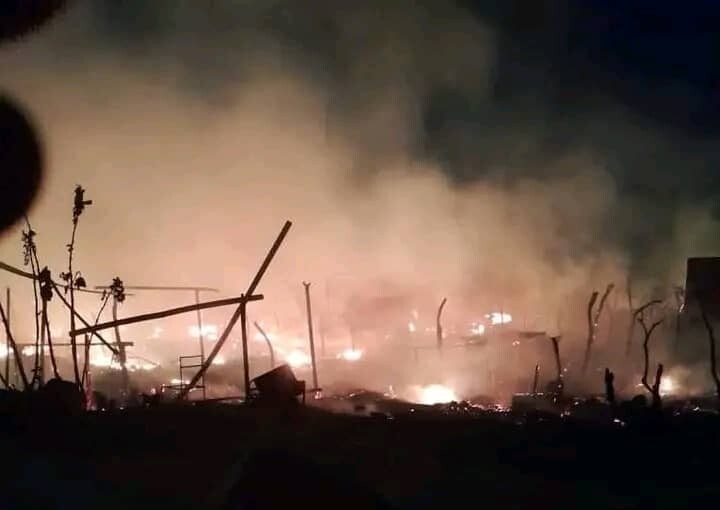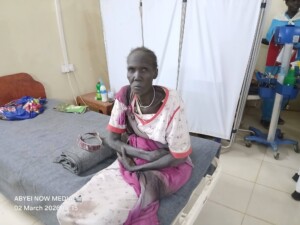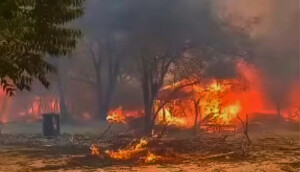Sudan Air Force bombing of North Darfur capital leaves nine dead

Burning houses in el Fasher caused by airstrikes, March 25 (Photo: El Fasher Resistance Committees FB page)
Nine civilians were killed, and 14 others were injured, including children, in an air raid on El Fasher, capital of North Darfur, early this morning, the second attack by the Sudanese Air Force on the city within 24 hours. Kutum town was also bombed.
Speaking to Radio Dabanga, residents of El Fasher said that the airstrikes took place between 2:00 and 3:00. People in Kutum town, about 120 kilometres northwest of El Fasher, reported similar bombardments later this morning.
At least five houses burned to the ground, the sources added. Medics told Radio Dabanga that the injured were transferred to the city’s Southern Hospital.
The air raids on El Fasher led to losses among the Rapid Support Forces (RSF) stationed in the northern and eastern parts of the city.
The El Fasher Resistance Committees said in a statement on its Facebook page that “the warplanes launched air strikes on various parts of El Fasher, on the El Wifag neighbourhood in the north, El Masnaa in the east, and Sharg El Wehda in the south, which led to the destruction of homes and factories, and the displacement of people living in El Wifag”.
Yesterday, the Sudanese Air Force launched similar raids on RSF targets at the Halouf Gate in northern El Fasher.
On Saturday, two women were killed, and others were injured in the city’s El Gubba neighbourhood as a result of an exchange of artillery shelling between the army and the RSF.
Mutual shelling last week destroyed the North Darfur Ministry of Livestock offices in El Fasher and injured several displaced people and destroyed homes in the Abu Shouk camp.
Kutum, under control of the RSF since June last year, witnessed aerial bombardments near the town at dawn today, residents reported. They could not give information about the losses.
The army also launched airstrikes on Kabkabiya and El Zurug last week. The RSF reported that the bombardments led to civilian casualties.
Battles
The RSF, which occupied Nyala and Zalingei in October, and El Geneina and Ed Daein a month later, last year also seized control of parts of North Darfur, The paramilitaries continue their attempts to seize El Fasher, the last capital of the five Darfur states, which remains for a large part under control of the Sudanese Armed Forces (SAF).
El Fasher is also the city where the government of the Darfur region resides and is home to the Darfur Joint Forces, made up of rebel combatants of the Sudan Liberation Movement faction led by Minni Minawi, governor of the Darfur region, other breakaway SLM groups and factions of the Justice and Equality Movement (JEM).
SAF-RSF fighting already occurred in the North Darfur capital since the start of the war in mid-April last year. In end April, the SAF gained control over the city, prompting RSF’s retreat to the camps for the displaced northeast of the city and areas further north. The then North Darfur Governor Nimir Abdelrahman, a former rebel leader, managed, together with native administration leaders, police officers, and civil society activists, to make the warring parties in the region agree on a ceasefire and extend it more than once.
Following this period, the North Darfur capital witnessed fighting again. The RSF seized control of the eastern parts of the city, while the SAF fortified their hold over the western parts. Fighting continued on and off in the following months.
Security conditions began to deteriorate rapidly in El Fasher in late October as violent clashes erupted again between the two parties and led to mass displacement. An estimated 85 per cent of the population of the city’s northern neighbourhoods fled their homes, either for safer areas in the south of El Fasher, for Mellit or even Libya.
Renewed SAF-RSF battles erupted last month, again prompting fears that rebel combatants would get involved in the fighting. The RSF taking full control of the city would reportedly also ignite strife between the Arab tribes supporting the RSF and the Zaghawa tribe, from which most North Darfur rebel fighters hail, and lead to a “catastrophic bloodbath” in the area.











 and then
and then